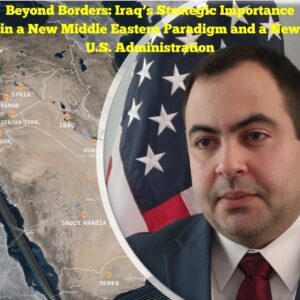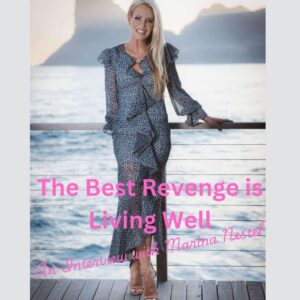
In light of the rapidly changing circumstances in the Middle East, and the recent developments, there are many questions about the future of Iraq, particularly following the collapse of the Hezbollah system in Lebanon and the swift downfall of the Iranian-backed regime in Damascus.
What does the future hold for Iraq? How will U.S. foreign policy toward the Middle East evolve under the incoming Trump administration? How can the new administration establish a political balance in the region that fosters peace and stability while advancing shared strategic interests?
To explore the answers to these questions, I recently had the opportunity to interview Mukhlis Mukhlis. A renowned expert on foreign affairs, with more than two decades worth of experience with national security, counterterrorism, and the geopolitical conditions of the Middle East.
A proud American of Iraqi descent, Mukhlis comes from a family that has significantly influenced the political and social landscape of several Arab states since the early 1920s. His family was pivotal in establishing the Arab Kingdom of Syria under King Faisal of the Hashemite dynasty, who later became King of Iraq. The family also contributed to the creation of the Emirate of Trans-Jordan, which evolved into the Hashemite Kingdom of Jordan, and played a key role in founding the Kingdom of Iraq in 1921 and Iraq’s first national army.
The Mukhlis family has shaped Iraq’s political foundation, resisted Ottoman and British colonialism, and was instrumental in establishing the Iraqi state during the monarchy era from 1920 to 1958.
Mukhlis’ family maintained extensive social and tribal connections throughout the Arabian Peninsula, Jordan, and Syria, positioning them at the center of the region’s political landscape. Despite this, Iraq has always remained their focal point.
With this wealth of history, and in-depth knowledge of Iraq, I asked Mukhlis about his assessment of Iraq in light of the current situation in the region.
Mukhlis indicated that Iraq had become geopolitically isolated, particularly following the collapse of Hezbollah’s system in Lebanon and the collapse of the Iranian-backed regime in Syria.
His interpretation of the regional scene leads him to believe that the recent developments have transformed Iraq, which was previously viewed as the primary conduit for logistical and military support for Iran’s operations in the Levant, into the final bastion of the Iranian Islamic Revolution’s expansionist agenda that began with the regime’s rise to power in Iran in 1979.
Mukhlis is also known for supporting President Trump since his first term and is recognized for his strong connections with several members of Trump’s new team.
When inquired about his willingness to assist the new administration in navigating this complex process, Mukhlis indicated his readiness to leverage his expertise, deep understanding of strategic challenges, and personal and familial historical ties in the region to aid the Trump administration in its efforts to restore stability in the Middle East.
Mukhlis further stressed that as President-elect Donald Trump begins a new term, the intricacies of U.S. foreign policy toward Iraq reveal both significant opportunities and considerable challenges. Given Iraq’s geopolitical significance in the Middle East, a strategic focus on rebuilding the country’s political structure, countering Iranian influence, and actively engaging in Iraq’s energy sector emerges as essential for fostering regional stability. This approach not only aims to enhance the economic prospects for American businesses but also addresses the burgeoning demand within the Iraqi market.
President Trump has consistently advocated against unnecessary military interventions in the Middle East, particularly regarding the Iraq invasion. Nonetheless, his renewed focus on international affairs presents an opportunity to reshape U.S. foreign policy in a way that not only enhances America’s global standing but also strengthens international alliances. This vision integrates domestic interests with foreign policy, emphasizing economic growth through enhanced trade, security partnerships, and geopolitical collaborations.
In order to establish a pragmatic roadmap for U.S. engagement in Iraq, it is essential to first recognize the strategic significance of Iraq within the broader geopolitical context. Subsequently, a comprehensive assessment of the challenges encountered in American foreign policy over the past two decades will be instrumental in guiding reforms that are designed to achieve enduring strategic objectives, in harmony with the interests of the United States and its regional allies.
What are the key strategic interests of the United States in Iraq?
Mukhlis sees Iraq’s importance to the United States as multifaceted. Its strategic location in the Middle East positions it as a pivotal player in regional stability, capable of counteracting the influence of other powers, particularly Iran, should Iraq become a truly sovereign country and free of the Iranian dominance that has been demonstrated for the past two decades that followed the regime change in 2003. Should the U.S. ignore or abandon Iraq, Iran would be strengthened considerably, posing a serious threat not only to the region but way beyond the regional boundaries.
Additionally, as one of the world’s largest oil producers, Iraq’s energy resources are vital to global oil markets, linking U.S. interests in secure energy supplies to Iraq’s production capabilities. Furthermore, Iraq has been central to counterterrorism efforts, particularly in the fight against Al-Qaeda, ISIS, and other radical groups framing U.S. involvement in the region as a means to promote security and combat extremism.
Delving deeper into the significance of Iraq on the regional and international levels, Mukhlis explained a number of important aspects:
Geo-strategic Context
Iraq’s critical geographical position, situated amidst Iran, Syria, Jordan, Turkey, and the Gulf States, renders it a vital logistical hub for regional security.
Economic Context
Iraq is rich in diverse resources, holding the fifth-largest oil reserves globally and ranking twelfth for natural gas reserves. Additionally, it boasts the largest sulfur reserves in the world and the second largest reserves of phosphates, iron, silica, and other minerals, which means Iraq possesses significant economic potential, potentially rivaling or exceeding the returns from crude oil if these reserves are effectively harnessed through a strategic industrial approach and careful investment.
Geopolitical Considerations
Many experts in Iraqi political and security dynamics assert that prioritizing Iraq’s geopolitical significance should be a central tenet of U.S. foreign policy. This is crucial for several reasons, chiefly to mitigate the expansion of Iranian influence in the region, which poses a risk of igniting a regional conflict detrimental to U.S. interests, not only in the Middle East but globally.
Practical Dimensions
A prosperous Iraq would likely enhance its capacity to combat extremist groups. This shift could diminish the need for direct U.S. military engagement and pave the way for more effective counterterrorism partnerships, while strategically, a stable Iraq could emerge as a vital ally for the United States, counterbalancing the influence of regional powers like Iran and addressing the economic expansion efforts of nations such as Russia and China.
Additionally, the presence of a stable Iraq might lessen the necessity for a large U.S. military footprint in the region. This would allow for a reallocation of resources to other strategic priorities. If the proper systems are established, Iraq could evolve into a pivotal military and intelligence ally, capable of conducting various operations in collaboration with U.S. forces, similar to the relationships the U.S. maintains with Jordan and other regional partners.
In summary, the prospect of a stable Iraq presents an opportunity for the United States to cultivate a more favorable environment for its interests, ultimately promoting peace, security, and economic growth both regionally and domestically. A stable and prosperous Iraq holds considerable implications for the United States, shaping both regional dynamics and U.S. foreign policy.
The Roadmap to the Revitalization of Iraq
First, it is crucial to reaffirm U.S. support for the secular factions, intellectual leaders, and the largely unorganized silent majority within various opposition movements striving for a peaceful resolution. These groups, while lacking a unified structure or central leadership to rally around, represent a significant force for positive change.
Second, there must be a concerted effort to dismantle the ideological foundations that radical and terrorist organizations rely upon to cultivate and recruit their operatives.
Finally, it is vital to weaken and disrupt states and regimes that promote and sponsor violence, while simultaneously perpetuating a monopoly over criminal organizations, militias, and armed groups that seek to exert influence and instill terror. Such measures are necessary to create a more stable and secure environment conducive to lasting peace.
Mukhlis strongly believes that initiatives aimed at fostering and strengthening peace in the Middle East and beyond are crucial, founded on mutual understanding and coexistence. These efforts highlight the importance of respecting human dignity and freedom, including religious liberty, which are vital for nurturing harmonious relationships among nations and communities.
Building on this foundation, the U.S. has a significant opportunity to further advance its vision for a stable and prosperous region. By leveraging the principles of cooperation and dialogue, we can promote partnerships that enhance peace and stability, paving the way for a brighter future for all involved and for generations to come.
Mukhlis believes that the United States must undertake a comprehensive restructuring of its relationship with Iraq through a series of political and legal frameworks. If the U.S., in collaboration with its allies and the international community, can facilitate internal changes that empower Iraq to become a stable, strong, and independent nation, it will significantly contribute to peace in the region while advancing U.S. strategic interests. This endeavor would help establish a robust framework for a cohesive and allied system that values peace, strengthens strategic ties, and enhances regional security, as well as economic and scientific prosperity alongside partners in the region and globally.
The Iraq we envision, and the one that the Iraqi people aspire to, urgently requires U.S. support as a partner in achieving the balance and stability they seek. Moreover, there is a critical strategic interest for the United States in Iraq, particularly in the long term, as it pertains to countering the growing economic and political influence of Russia and China in the Middle East, and specifically within Iraq. Both the Russian and Chinese governments are actively working to expand their presence in Iraq, often at the expense of U.S. interests, which has resulted in a decline of U.S. economic investments, most notably in the energy sector, where Russian and Chinese companies have supplanted American firms. This shift has serious implications not only for Iraq but also for other countries in the region, particularly those where the energy sector serves as a cornerstone of both national and global economies.
How can the U.S. counter Iranian influence in the region?
Mukhlis emphasizes the importance of understanding the threat posed by the Iranian regime to develop effective countermeasures. This will necessitate sustained efforts to create a cohesive political framework among regional nations, align their positions, and devise practical strategies to address the Iranian threat. It is also crucial to encourage collaboration among these nations and Israel to establish a parallel deterrent force, particularly in Iraq, recognized as a key strategic front against Iranian expansion.
Countering Iranian influence is vital to U.S. strategy in Iraq, as Iran’s significant control over the country’s political and military institutions often undermines its sovereignty. To effectively tackle this challenge, the U.S. must empower Iraqis to shape their own future and build the government they aspire to, as the narrative of democracy in Iraq has often been misleading, with a rigged electoral system in place.
The potential for Iran to achieve nuclear capabilities further complicates the situation, enabling it to project power and exert influence in response to strategic setbacks, especially in Lebanon and Syria, where Hezbollah’s network has weakened and the Syrian regime has collapsed.
Iran’s strategic gains in Iraq are well-documented, particularly in circumventing U.S. economic sanctions. The Iranian regime has leveraged its allies in Iraq to support its operations and affiliated terrorist organizations across the West Bank, Gaza Strip, Lebanon, Syria, and Yemen.
U.S. foreign policy should focus on strengthening Iraq’s relationships with its Arab neighbors and fostering regional alliances to enhance Iraq’s connections with Gulf states and other regional partners.
Envisioning a new U.S. strategy for counterterrorism
Mukhlis explained that a definitive understanding of the term terrorism is essential. Initially, it is crucial to categorize violent reactions or insurgency into two distinct scenarios: certain groups may be effectively managed through a policy of containment. This is a principle recognized by most counterterrorism experts especially those in the intelligence community. Actively engaging with these groups to discern their intentions through direct dialogue and negotiations can potentially yield positive outcomes. Mukhlis has firsthand knowledge of numerous instances of this approach through direct involvement during the years following the regime change in Iraq in 2003.
There is an undebatable fact that the U.S. approach to counterterrorism in Iraq has often been limited, focusing predominantly on specific radical factions identified by sectarian lines. In the pursuit of defeating ISIS, the U.S. has provided substantial support to various Iraqi armed groups, frequently overlooking their affiliations and connections to the Iranian regime. Many of these groups serve as regional proxies for the Iranian Revolutionary Guard, akin to Hezbollah and other recognized terrorist organizations. This sectarian approach has inadvertently concentrated power and control over Iraq’s strategic resources in the hands of a select few, marginalizing the broader Iraqi populace since the 2003 invasion.
One notable example was the dialogue initiated with the Taliban during the first Trump administration. However, the subsequent administration committed a significant strategic error. Rather than building upon the approach established by the Trump administration to facilitate a gradual, strategic, and secure withdrawal aimed at concluding two decades of conflict that yielded only losses for the United States, the Biden administration proceeded with a hasty and poorly planned withdrawal from Afghanistan. The repercussions of this decision are likely to manifest in the years ahead.
Operationally, a prevalent error in the counterterrorism effort is the emphasis on cutting off the financial resources that support terrorism, while neglecting to analyze the mindset and ideologies that motivate individuals to join these groups. It is crucial to understand the beliefs that compel these individuals to engage with such organizations. If there had been greater scrutiny of the curricula and lectures presented to students in Hezbollah-affiliated institutions in Lebanon, as well as the religious seminaries in Najaf, Iraq, and the training programs of the Iranian Revolutionary Guards in Qom and Tehran, we would gain valuable insights into how extremist ideologies are cultivated and sustained.
Counterterrorism strategies are a complex combination of approaches, methodologies and tactics that Mukhlis personally believes should not be discussed publicly, otherwise it would lose its effectiveness, validity and value. However, in general, the best strategy the new U.S. administration can develop and implement to effectively tackle counterterrorism in Iraq, is first to bring justice.
In summarizing over two decades of his personal experience in counterterrorism, it is evident that the primary catalyst for violent extremism, which may culminate in terrorism, is rooted in perceptions of injustice. A multifaceted strategy is imperative, one that transcends mere military engagement and addresses the foundational issues that fuel terrorism. This includes strengthening intelligence-sharing mechanisms with well-structured Iraqi security forces, promoting political stability, and driving economic development to create viable alternatives that diminish the allure of extremist ideologies. Furthermore, fostering engagement with local communities and supporting grassroots initiatives focused on reconciliation and unity will be critical to cultivating a resilient society capable of withstanding terrorist influences. While the complete eradication of extremist ideologies may be unattainable, it is feasible to disrupt and diminish the factors that sustain these ideologies.
But how do we get there?
The Middle East has faced, and continues to face, significant challenges and enduring conflicts, resulting in tremendous losses in lives, property, resources, and potential futures for its people. Now, more than ever, it is imperative for the citizens of this region to adopt a fresh approach centered on peaceful coexistence, grounded in mutual respect among civilizations, religions, nationalities, and, most crucially, the human element.
This vision for a harmonious future cannot solely be realized through governmental action; it fundamentally relies on the awareness and commitment of the people themselves. A genuine desire for peaceful coexistence must emerge from the grassroots level, coupled with a firm rejection of terrorism, violence, and the pursuit of control. By fostering dialogue and understanding, the people of the Middle East can pave the way for a more stable and prosperous future.
A crucial aspect for success in the region is the significant Iraqi opposition that is currently in exile. Over the past two decades successive U.S. administrations and decision-making institutions have failed to recognize the widespread rejection of most individuals and parties that were given power in Iraq following the fall of the regime in 2003. In summary, what transpired in Iraq can be described as a transition from a singular dictatorship to multiple authoritarian factions, which transformed the country into a breeding ground for terrorism, crime, and corruption. Ultimately, Iraq has become a strategic base exploited by the Tehran regime and the Iranian Revolutionary Guards to support and finance criminal organizations and terrorist activities throughout the region.
The Iraqi popular opposition movement, present in every household and family, both within the country and among the renewed forces in exile, holds immense reserves of resources, energies, and aspirations.
The masses of popular opposition are actively involved, many are considered the silent majority, and others are residing in exile to escape injustice, tyranny, and persecution. Those in the United States are hopeful that the new U.S. administration under President Trump will provide them with the hope of a safer, more stable, and prosperous Iraq – one that is free from terrorism, corruption, and the influence of militias and sectarian political parties pursuing harmful foreign agendas that threaten peace and stability in the region.
This popular momentum seeks security, stability, and peace in the region, aiming to foster collaborative relationships that promote shared interests both regionally and internationally.
It is essential to acknowledge that the journey toward peace may necessitate a decisive confrontation with the forces of evil and darkness, whose sole objectives are destruction, instability, and bloodshed. Mukhlis believes that President Trump, along with many candidates in his prospective administration, understands this reality and has the potential to restore equilibrium through a series of strategic actions.
What is needed now is a completely new proactive, rather than reactive policy toward Iraq.
It’s not a secret anymore that the successive U.S. administrations since the regime change in Iraq were not properly engaged and at some point not just failed to address the challenges on the ground, but in fact they often contributed to the problem rather than being part of the solution. Given Iraq’s geopolitical significance in the Middle East, a strategic focus on rebuilding the country’s political structure, countering Iranian influence, and actively engaging in Iraq’s energy sector emerges as essential for fostering regional stability. This approach not only aims to enhance the economic prospects for American businesses but also addresses the burgeoning demand within the Iraqi market. A successful and stable Iraq would be a gift to the world.
This article was originally published on OpsLens.com.













